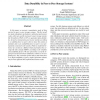Free Online Productivity Tools
i2Speak
i2Symbol
i2OCR
iTex2Img
iWeb2Print
iWeb2Shot
i2Type
iPdf2Split
iPdf2Merge
i2Bopomofo
i2Arabic
i2Style
i2Image
i2PDF
iLatex2Rtf
Sci2ools
138
click to vote
CCGRID
2004
IEEE
2004
IEEE
Data durability in peer to peer storage systems
In this paper we present a quantitative study of data survival in peer to peer storage systems. We first recall two main redundancy mechanisms: replication and erasure codes, which are used by most peer to peer storage systems like OceanStore, PAST or CFS, to guarantee data durability. Second we characterize peer to peer systems according to a volatility factor (a peer is free to leave the system at anytime) and to an availability factor (a peer is not permanently connected to the system). Third we model the behavior of a system as a Markov Chain and analyse the average life time of data (MTTF) according to the volatility and availability factors. We also present the cost of the repair process based on these redundancy schemes to recover failed peers. The conclusion of this study is that when there is no high availability of peers, simple replication scheme may be more efficient than sophisticated erasure codes.
Availability Factors | CCGRID 2004 | Distributed And Parallel Computing | Erasure Codes | Storage Systems |
Related Content
| Added | 20 Aug 2010 |
| Updated | 20 Aug 2010 |
| Type | Conference |
| Year | 2004 |
| Where | CCGRID |
| Authors | G. Utard, Antoine Vernois |
Comments (0)

